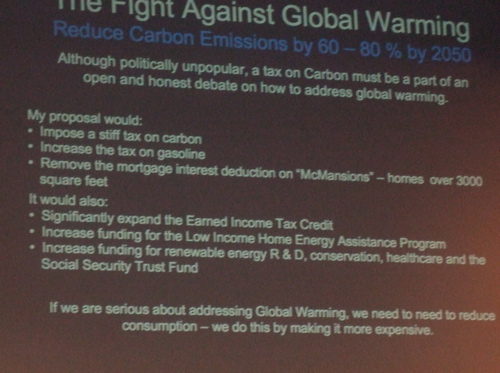
At today’s town hall meeting on global warming, John Dingell won over a lot of folks in the crowd. I could feel it. People came in ready to let him have it for voting against wind and solar on Saturday, and for fighting against more aggressive fuel efficiency standards, but, by the end, my sense was that people trusted him to do the right thing. And, I was close to biting. He made a persuasive case. When he laid out his global warming plan, using the Clean Air Act as a template, it made perfect sense. Good legislation, as he kept stressing, takes time. The drafting of the Clean Air Act, as he recalled, was, at the beginning, contentious. But, in the end, it passed overwhelmingly, with support from Democrats, Republicans and industry. He says that it will be “the most difficult undertaking in (his) life,” but he thinks the same thing can be accomplished with global warming legislation, if we give him time.
As he pointed out repeatedly, no one is going to be happy with the product that comes out of his committee, but we’ll all be able to live with it, and that’s the important thing. (He was pretty upfront about the fact that this is going to require sacrifice from everyone, and that it won’t be easy.) And, he kept pointing out that this bill of his would just be the first step, that other, more aggressive, legislation would certainly follow. I didn’t stand up and ask a question at the end, but one occurred to me as I sat there. “Representative Dingell, I believe you when you say that it takes time to write good legislation. And, looking at your plan objectively, I’d agree that it looks like a good first step. But what if you’re wrong? What if there isn’t time for follow-up steps? What if, while we’re going through the proper channels and building consensus, the window of opportunity to do something about global warming closes?”
And that’s why I’m still going to keep pushing Dingell to be more aggressive. I love and respect the man. But I don’t think that we have the kind of time that he thinks we do. Getting gas mileage up to 30 miles per gallon by 2020 just isn’t going to do it. We need for our first step to be a lot bigger. With all due respect to the Congressman, if we’re churning out vehicles that get 30 miles to the gallon in 2020, we’re dead.
Here’s an illustration. Take Saturday’s vote on renewable energy. Dingell voted against it. He said that he did so not because of the content of the amendment, but for procedural reasons. He said that the legislation should have come through his committee, where it could have been debated and refined. This may well be true. He might very well be able to produce better legislation concerning the funding of renewables this fall, but do we really have the time? I love Dingell, but I really question whether or not we have the time to do things his way. (It’s worth remembering that it took the Congressman almost two decades to come around to believing that global warming was even real.)
I’d love to get into all the specifics tonight, but they’re going to have to wait. But, before I go, I want to mention four quick things.
1. I believe I heard the Congressman suggest that coal is a renewable resource. Did anyone else hear that?
2. I loved his “McMansion” idea. (See his slide below.) Removing the mortgage interest deduction on homes over 3,000 square feet, is brilliant. I just wish we didn’t have to wait for his omnibus energy bill this fall to see it happen.
3. I cannot, for the life of me, figure out where he really stands on the idea of a gas tax. A few weeks ago, when he proposed the idea of 50 cent per gallon increase, I thought the message was pretty clear. At least all of the pundits covering the story seemed to think that it was pretty clear. They all reported that he was proposing it only to demonstrate that Americans didn’t have the stomach for it. At the time, he himself said, “I will be introducing in the next little bit a carbon tax bill, just to sort of see how people really feel about this. When you see the criticism I get, I think you’ll see the answer to your question.” But then today he said that he had “never,” in his 50+ years in the House, proposed legislation that he didn’t believe in just to see it fail. He says his support for a gas tax is unwavering, and that this has always been the case. Maybe it doesn’t matter. The important thing, I suppose, it that he’s on my side, at least for the time being.
4. I was happy to see how on-board he was with the idea of local rail. That, and the fact that he said he’d like to see the former Pfizer facility in Ann Arbor become a national biofuels research center, really made an impression on me. Hopefully he can put a little D.C. muscle behind both initiatives.
OK, that’s going to have to be it for now. If I can find a place to host it, I’ll get audio of the entire event up tomorrow. If not, maybe I can transcribe a few pertinent sections. Right now, though, I need to go upstairs and sleep on everything I’ve absorbed these past 48 hours.













15 Comments
Hey Mark. It’s Don Cupery, your oh so dedicated friend. I’ve been in Arizona the last 2 1/2 years but I’m recently back in Ann Arbor. I read some of your blog and I’m impressed by your dedication to it. If you have spare time sometime, email me or call (734 478-6260). We could have tea or something.
Some of my questions:
“You have long had a reputation as a climate change skeptic. Has there been a change in your thinking about global warming over the last couple of years, and if so, what led to this change?”
“You stated that there is a difference between imported carbon-producing fuels and American-made carbon-producing fuels. What difference is there between them in regard to global warming emissions?”
“Would a $.50 increase in the gas tax significantly change driving and car-purchasing behavior? Wouldn’t we need an increase more in the range of $1-2 to significantly change behavior?”
I was impressed by a couple of audience questions that suggested that rather than rely on cap and trade, it would be better to impose high energy taxes and then rebate most or all of the proceeds to citizens. It will be difficult to gain popular support for new energy taxes, but we can help to do so by using these taxes not to raise revenue, but solely to pass on the cost of pollution to citizens, giving us all a real incentive to reduce pollution.
True … great legislation takes time. Clever and memorable speeches take time.
Corporate boards, production lines and engineering, new engine designs … they all take a lot of time.
While all of this is true … 10-15% of the glaciers in the Swiss Alps have all but disappeared … the Greenland ice sheet has nearly been undermined and is beginning to weaken … same in Antartica.
We’re so far behind the clock.
My points recently is that while Dingell has dangled in committee over the last 20-30-40 years … we had the wherewithall, thee technology and the dollars to solve the problem.
What has been clevwer is how the REAL problem was never discussed. Until recently, Global Warming or Global Climate Change, was not the issue. The scientists and politicians were at each other about … the horned owl … or narwals … or prarie dogs … or some archipeligo somewhere. Very clever. Breaking up the real issue into little nagging problems that were eventually settled.
But in the meantime, the Chinese economy is growing and burning fossil fuels like crazy. No, Mark, coal is NOT a renewable resource, and liquification is not the best thing to do with it.
Bottom line … Dingell is back in committee … it’s 30-40 years after the first Datsuns and Renaults hit the beaches … and we are now in a global race against Mother Nature, risking the lives and fortunes of billions of people. And he wants us to wait while he’s behind closed doors.
Sheesh!
I was in a meeting last week where a participant bemoaned the distractions presented by “charismatic megafauna.” It’s my new favorite phrase, and perfect for discussing narwhals and owls.
I still prefer “mother fucker”, but “charismatic megafauna” does have a nice kick to it.
It’s not great footage, but someone in the audience has posted video of Dingell’s speech.
http://www.blogsmonroe.com/expatriate/?p=498
“We need to need to reduce consumption” might be a typo? In any case I sure liked seeing in writing the congressman’s bottom line re. reducing consumption and the idea of not sponsoring McMansions. (On that, Benjamin Barber’s new book CONSUMED is very good–many old points made but brought together comprehensively, and his bottom line is that all our private choices have left us with a country none of us wants and that we need to stoke the public citizen aspect of our beings way above the private consumer aspect to get our country back.)
It’s easy to fault the Big-3–their choices these past twenty years, when they knew better, have been maddening and damaging–but there have also been a whole lot of people from this very area who spent the past years buying and driving the gas-guzzling beasts. People were so giddy about their big SUVs, when surely they knew as well as the automakers that this would ultimately (and quickly) be very bad for all of us. It’s a complex issue . . . but that’s not an excuse to be slow to fix things. But it really does seem important to keep in mind how truly complex the matter is–somehow be able to consider the nature of our very imperfect political system, the health of the planet, the long string of enterprises that get destroyed in the trickle-down when big companies struggle–from beauty parlors to schools to parts manufacturers and on and on–with actual precious people being badly hurt in the meantime.
I worked at the Ford Wixom plant many moons ago, and it was always surprising to see how full the immense parking lot was with the cars made at the plant, Continentals, when they were the priciest Fords to buy and to keep running. But we got special incentives beyond the usual discounts to buy these cars, so plenty of workers there did, even though with the discount the cars were really expensive. Buying decisions, worker dedication, marketing, job security, the health of the planet . . . so many ingredients to consider and then some. And having worked there, I’d never bemoan the wages and benefits paid to autoworkers, who deserved what they were getting and then some, plus great respect.
Two dapper gentleman were walking out of the town hall meeting yesterday when I did and said, “Ain’t democracy great?” They’d driven 45 minutes to attend the meeting. The crowd was a pleasing mix of old, young, and variety otherwise. Heartening. I’d love to get to the one today in Dearborn–not sure I’ll make it, though.
From the Ann Arbor News website:
U.S. Rep. John Dingell, in a visit to Ann Arbor on Tuesday, said he will introduce legislation taking aim at global warming that includes a new tax of up to 50 cents-a-gallon on gasoline.
Rep. John Dingell says he will propose legislation to raise the gas tax by up to 50 cents.
Dingell, who has been the target of recent protests by environmental activists over his ties to the automobile industry, said the new gas tax would be part of a broader carbon tax on the burning of fossil fuels that emit carbon dioxide, a greenhouse gas. Dingell also wants to end the mortgage interest deduction on homes greater than 3,000 square feet, which he called “McMansions.”
“It is my intention to write the best piece of legislation possible,” he told a crowd of several hundred people inside an auditorium at Pioneer High School.
Dingell, a Democrat from Dearborn, which is home to the headquarters of Ford Motor Co., said he wants to write legislation to reduce the emission of global warming gasses by 60 to 80 percent by 2050.
Environmental activists have protested against Dingell, who is chairman of the House Energy and Commerce Committee, for not doing enough to combat global warming. And he has been at odds with some of his party’s leaders over raising fuel economy standards for automobiles.
Read today’s Ann Arbor News for more details.
From the Detroit News-
U.S. Rep. John Dingell, the Dearborn Democrat who chairs the Energy and Commerce Committee, is proposing a 50-cent tax on a gallon of gasoline and suspension of mortgage deductions for what he calls McMansions — homes over 3,000 square feet.
Dingell continues to press the point that if we believe global warming is so serious a threat that it’s worth destroying the automobile industry, then it’s also worth spreading the pain to as many other places as possible.
His proposal is aimed at the Hollywood hypocrites who testify before Congress about the evils of the auto industry and then fly private jets back to their 30,000-square-foot hillside palaces. If the smug global warming warriors who park their Priuses in four-car garages want to cram everyone else into wheeled shoe boxes, then they should be willing to bed down in cracker boxes.
Heating and cooling giant houses produces as much carbon as driving a sport utility vehicle.
And Dingell is right in reminding consumers that they can’t keep crying for Detroit to develop more fuel-efficient cars while demanding cheap gasoline and vehicles large enough to haul a soccer team.
http://www.detnews.com/apps/pbcs.dll/article?AID=/20070809/OPINION01/708090308/1008
I really wish that we could get away from the whole global climate change schtick. All it does is get the hardcore conservatives to dig in their heels and fight pollution prevention measures.
We need that ‘wordsmith spin’ guy who works for the Republicans to spin and repackage the term Global Warming in a way that is palatable to conservatives.
I always thought that the whole reduce dependence on foreign oil and help US farmer was the way to pitch this stuff.
As in, “hey were not taxing gasoline, we’re just using that money to get the hell out of the Middle East by researching alternative fuels. The terrorists get their money from oil.” Or “all this $$ goes to midwest farmers for research into windpower or ethanol fuel”.
You just have to pitch it right. If you say the phrase Global Warming, they think Gore and Hollywood, and the conversation/legislation is all but over.
I think you make an excellent point, Todd. I’m glad you said it. Get ready for the people at this site to jump all over you…
…well, as soon as they get back from their Greenpeace letter writing event at the brewery…
…That may not be until Sunday afternoon, actually.
Well, I’m certainly not saying the Global Warming isn’t happening. In my opinion, it is. But people are criticizing Dingell for not working fast enough. He’s not working “fast enough” because there is opposition to what he is trying to do. All I’m saying is, let’s phrase this in a way that the opposition goes away.
The Republicans are the world-champions in reworking issues to make them ‘votable’, for lack of a better term. Whey not learn from them? It’s not lying, its focusing the ‘reason’ for things like the gas tax or whatever on things that conservatives are likely to vote for. Oil/Energy independence is an example. Capitalize on the Bible Belt’s xenophobia.
For what it’s worth, I think I agree with you Todd… And I respect the hell out of Dingell for pushing this as far as he is. A gas tax is an unpopular thing, and I’m proud of my Congressman for being the one to propose it. I just think that he needs to know that some of us want more.
I want more, too, Mark. I’m 100% with you on that. And there’s nothing wrong with telling him that, or protesting to tell him that. But I think that we are selling ourselves short by couching the issues in the manner that we are.
It isn’t working. Check that….it isn’t working FAST ENOUGH.
I just now happened across this on the New York Times site. Apparently a reporter from the paper had flown into Michigan when he got word that Dingell was holding a town hall meeting on global warming. Here’s his report:
Dingell frustrates the hell out of me, but you’ve got to admit that he knows the game and plays it well. That bit about proposing a nuclear waste dump in Nevada was just brilliant.